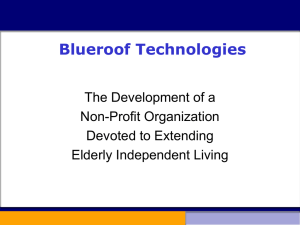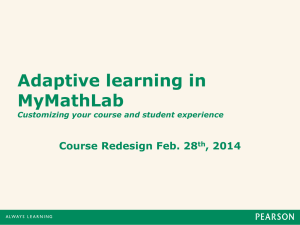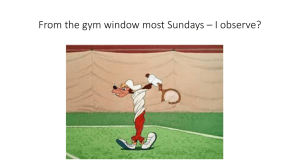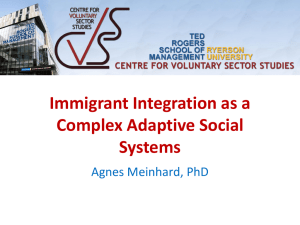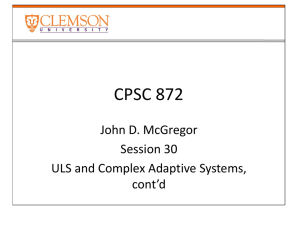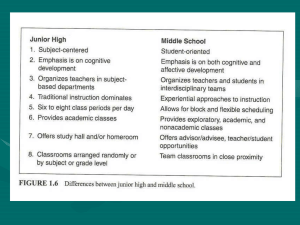awareness - Jim Casey Youth Opportunities Initiative
advertisement
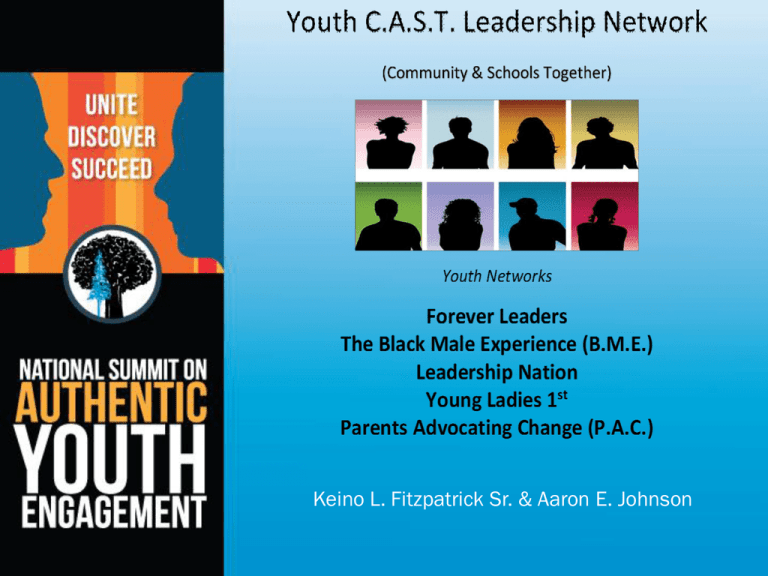
Keino L. Fitzpatrick Sr. & Aaron E. Johnson Our Mission: Youth C.A.S.T. Leadership Network is a youth driven full service development model that will establish and provide a range of supports and services that will focus on creating a high-quality extended social & educational environment relating to supporting positive social emotional learning experiences for youth in grades 6th through 12th Our Goals • To engage with community groups, school administration, businesses, and local government for overall youth achievement and success. • To focus on the change of both internal and external relationships through the action of leading a group of youth as community and schools begin to give youth a model or system they can sustain after implementation. • To encourage youth, community, and schools together to recognize the importance of leadership while advancing their effectiveness to develop a leadership model recognized through youth lead activities and actions of service learning, advocacy, and civic engagement opportunities. Our Process • On May 24, 2012, approximately 40 community leaders and concerned citizens came together as part of the City of McKeesport’s Mayors’ Select Committee on Crime and Violence. This committee was selected to be a part of what was dubbed “Planning the transformation of our City” as working together for a better McKeesport. Those in attendance represented the local government, school district, faith-based groups, law enforcement, youth organizations, businesses, social service agencies, universities, libraries, community organizations, and parents. Our Key Partners City of McKeesport, Mayor’s Office Urban Achievement Aristotle’s Education Emporium Bethlehem Baptist Church McKeesport Area School District Saturday Light Brigade McKeesport YMCA of Greater Pittsburgh Larosa Boys & Girls Club of McKeesport Pitcairn Pa. Circles Initiative National Center for Innovation & Excellence Carnegie Library of McKeesport What is Leadership? • Leadership connotes releasing of energy, building, freeing, growing (Peters and Austin, 1985) • Ability to influence the actions of others (Halloran and Benton, 1987) • The ability to motivate • Everyone has leadership potential (Bennis and Nanus, 1985) Why study youth leadership? • Youth are in need of leadership positions – Home – Community – School • To asses whether adolescent have the right “tools” for success – Student-Parent surveys & Focus Groups – Exploratory Learning Experiences Supports Youth Developmental process Youth Leadership Research • Three Stages – Awareness – Interaction – Mastery • Five Dimensions – Leadership Information – Leadership Attitude – Communication Skills – Decision-making Skills – Self-management Skills Awareness • Focus on initial awareness of one’s leadership potential and abilities • Youth in this stage: – Do not think of themselves as a leader – Do not feel capable of being a leader Awareness Interaction • Growth in leadership skills occurs and confidence solidifies through interaction • Youth in this stage: – Have a limited definition of leadership – Believe that the leader is “in charge” – Need adult support and guidance Mastery Adaptive Leadership Developing Others Values Differences Integrity Lifelong Learning Development Credibility Character Outcome Concern Info Sharing Decision Fairness Relationship Mgmt Organizational Justice Social Awareness Self Awareness Self Mgmt Emotional Intelligence 4 4 5.33 5.67 5.25 5.33 4 5.67 6 4 5.25 4.33 2.33 4 4 3.33 2.75 2 2 2.67 3 2.67 3 3 5.67 5 3.67 4.67 4.75 5 4.33 4 6 5.67 5.75 5.33 6 6 6 6 6 6 6 6 6 6 6 6 4 4 4.67 4.67 4.5 1.67 4.67 4.33 5.67 5 4.5 4.33 5 5.67 6 5.33 4.5 5 4 6 4.67 5.67 5.75 6 4.67 5 3.67 5 4.75 4.67 2.67 4.33 3.67 3.67 4.25 3.67 4.33 4.67 4 4.67 3.5 5.33 5 2.67 5.67 4 5.25 4.67 3 3 3 4 2 3 1.67 3.33 1.67 4 2 2.5 3.33 5.33 5.67 5 4.5 4 4.33 5 5 5 5.25 6 3.33 3 3.33 3.67 3 3.33 3.33 3.33 4.33 3.33 3.75 3.33 4.150909 4.515455 4.576364 4.546364 4.151818 4.91 4.273636 Youth-Driven Development Stop, Look, Lead – SL2 Our F.L. Ambassadors’ Objectives • To increase their adaptive leadership skills which will enable them to become meaningful community assets. • To envision leadership by establishing the dynamics of adaptive leadership as they experience leadership within their community. • To provide opportunities and support to utilize their knowledge and skills of adaptive leadership to their peers outside of Youth C.A.S.T. • To provide real-life situations where youth can demonstrate through active participation their engagement of the adaptive leadership model. • To increase their sense of community and shared responsibility within Youth C.A.S.T. The Five Dimensions of Youth Leadership Development Information SelfManagement Decision Making Attitude Communication Leadership Information • What adolescents know about leadership and leaders • Accurate information is critical in this process • Adults help teens discriminate information and navigate barriers • What adolescents know about leadership is limited Leadership Information Black Male Experience- “McKeesport Voices” Victorious Leadership 2.0 Workshop Leadership Attitude • Adolescents’ dispositions, thoughts and feelings towards identifying themselves as leaders • Attitudes are learned and applied • Attitudes are constantly altered and enhanced Leadership Attitude Exploratory Leadership Experience- Youth Ville, Detroit Communication Skills • The exchange of thoughts, messages and information • Process of sharing ideas and reflection • Includes both verbal and nonverbal communication Communication Skills General life lessons and outlook from boys and men Decision-Making Skills • Choosing between competing courses of advocacy and action • Creates a discrepancy between transactional and transformational leaders • Decision-making is a process that becomes part of problem solving skills Decision- Making Skills Youth-Driven Name, Logo, & Brand Voting for Project Implementation Self-Management Skills • How adolescents react to and deal with the stress in their lives – Ability to regulate stress – Staying flexible and directing behavior in a positive manner • Pertains to issues of autonomy and locus of control Self-Management Skills Ambassadors visitation to Detroit City Year Ambassador visitation to Indiana University of Pa Youth C.A.S.T. Model • Home • Community • School Home To provide a “conscious process” framework for working with families. By providing workshops and opportunities, to engage families in relevant discussions and projects within the community and school. Family Engagement at the August Wilson CenterPittsburgh, PA Community • We cannot seek achievement for ourselves and forget about progress and prosperity for our community…our ambitions must be broad enough to include the aspirations and needs of others, for their sake and our own. Cesar Chavez Community Thanksgiving day dinner Community Service for homeless McKeesport Holiday Parade Engagement School • “A student never forgets an encouraging private word, when it is given with sincere respect and admiration.” William Lyon Phelps School Youth-Driven Exploratory Leadership Tour University of Pittsburgh Evaluation Process • Assessment Findings • Application • Experiences • Support • Roles Youth C.A.S.T. National Center for Innovation and Excellence • Rapid Assessment Procedures (RAP), which include a combination of focus groups informed by brief-time limited interviews informed by fieldbased observation • Relationship between their stages of development, their leadership development, and type of leadership experiences Assessment Findings • According to our findings, the next step in the program overwhelmingly seems to be building in rich activities that can engage the youth on multiple levels. These will, in turn, be the catalyst youth identified as critical to the expansion of the program. Application-- Moving youth through the stages • The importance of (experiences) • The role of adults (support) • Roles in youth, community and school (partnerships) Youth-Driven Exploratory Leadership Tour to IUP with Community Activist Michael Skolnick Experiences for Youth- Exploratory Leadership Opportunities • Knowledge • Skills • Practice Youth C.A.S.T. Trip to Don Bosco Hall, Detroit Support-- The Role of Adults • Mentoring/Guidance • Resources • Role models Resources (books, CDs, Story-Box units, website) that (1) document and celebrate experiences and (2) serve as resources for the community at large. Roles in Community and School Partnerships • Allow youth the means to develop leadership skills through practice • Make it authentic & meaningful! Community and School Celebration Youth C.A.S.T. Panel Session
